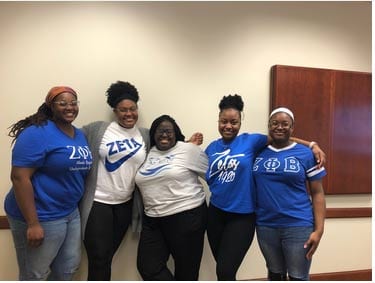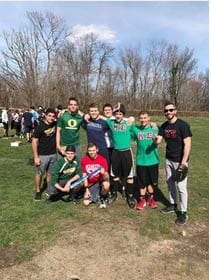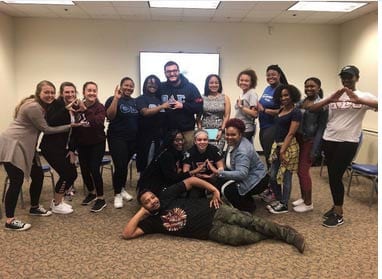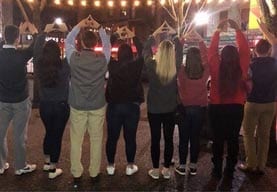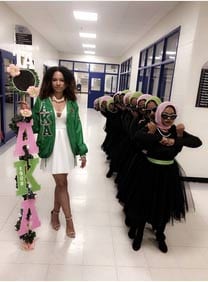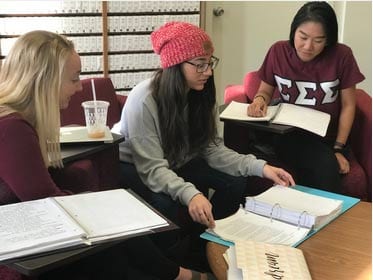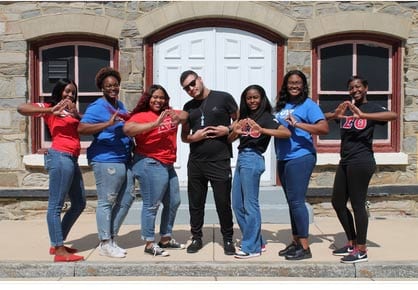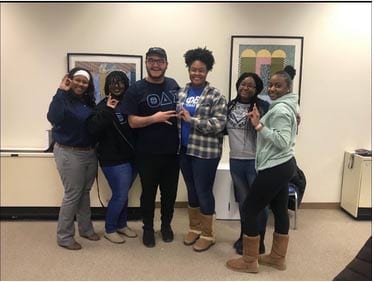Greek Life Vocabulary
General Terms
Active:
An initiated, dues-paying member who is enrolled in the university.
Badge:
A “pin” worn by fully-initiated members of each fraternity or sorority that carries its official insignia.
Bid:
A formal invitation to join a fraternity or sorority.
Big:
Nickname for big sister or brother, a mentor assigned to a new member. Many organizations have special names for these pairings.
Chapter:
A membership unit of a national or international sorority or fraternity.
Charter:
The official document drafted by an Inter/National fraternity or sorority that allows for the creation of a local chapter that is affiliated with a college or university campus.
Class or “New Member Class”:
A term used to name new members of a Panhellenic Council or Interfraternity Council organization who all joined during the same semester.
College Panhellenic Council:
The governing body for all Panhellenic women’s sororities on the campus.
Colony:
A new organization that is awaiting official recognition from their national to have a chapter at a campus.
Crest:
Insignia used by sorority and fraternity members. Most Greek organizations reserve the crest for initiated members only. Each crest has hidden, secret meanings behind it. Also known as a coat or arms or shield.
Dues:
The monetary costs of membership in a fraternity or sorority. These fees are used to cover the costs of operation, formal events, social activities, and other events, depending on the organization.
Fraternity/Sorority:
A group of individuals bound together by ritual, common ideals, and a strong bond of friendship and brotherhood or sisterhood. (The term “frat” should not be used when referring to a fraternity).
Founders Day:
An event celebrated by fraternities and sororities to highlight the founding of their organization and celebrate its history. It’s not necessarily held on the day the organization was founded.
Grad:
A member of the organization that has graduated from college and continues to stay active with the organization by way of a graduate or alumni chapter.
Infraction:
Infractions can be given to any Panhellenic or IFC organization that violates the rules of the recruitment or rush process.
Initiation:
The traditional ritual or formal ceremony of induction, which marks the transition to full membership of a fraternity or sorority.
Intercultural Greek Council (IGC):
The governing body for National Pan-Hellenic Council (NPHC), Divine Nine organizations on Widener’s campus.
Interfraternity Council (IFC):
The governing body for all men’s social fraternities on campus.
Legacy:
To be a legacy means that you have an older family member (brother, sister, mother, father, grandmother, or grandfather) who was a member of a Greek organization.
National Pan-Hellenic Council (NPHC):
The governing body for all historically-black fraternities and sororities (known as the “Divine Nine”) on campus.
Philanthropy:
Philanthropy is a term used to describe charitable events performed by Greek organizations.
Prospective Member:
A term used for undergraduate men and women interested in becoming a member of a fraternity/sorority.
Recommendation:
A statement or letter from an alumnus/alumna or an active member of a fraternity/sorority, which recommends a prospective member for membership.
Ritual:
The traditional rites and ceremonies of a fraternity or sorority; these are almost always private and known only to initiated members of a fraternal organization.
Interfraternity Council (IFC) Terms:
Alumnus:
An initiated member of a fraternity who has graduated from college and is no longer an active member (plural: Alumni).
Brother:
The term used by members of men’s fraternities when referring to each other.
Neophyte:
A new member of an organization who has completed the new member process, but not yet been initiated.
Open Recruitment:
A designated recruitment period during which each of the men’s fraternal organizations in the IFC host recruitment events at their own houses. This type of recruitment is considered “informal” because potential members need not follow a designated schedule.
Rush:
See Recruitment. Rush is an outdated word that was replaced in 1999 by recruitment. Rush referred to the practice of fraternities “rushing” to the train station to meet the newest members of the freshman class of a college or university and pinning their fraternity colors on the freshmen to identify them as a potential member of that fraternity.
Intercultural Greek Council (IGC)/National Pan-Hellenic Council (NPHC) Terms:
Cross:
Initiated, at the end of the recruitment period after being evaluated by the organization the aspirant is seeking. The new member then “crosses” over from a pledge to a new member.
Frat/Brother:
The term NPHC fraternity men use to refer to each other within their organization.
Membership Intake Process (M.I.P.):
The process adopted by the NPHC and all of its members in the early 1990’s to put an end to dangerous rites of passage practices and hazing. (Hazing is illegal in ALL our organizations AND in the United States courts of law).
Neo:
An abbreviated term for the Greek word Neophyte, meaning beginner. A neophyte is someone who is new to the organization.
On Yard:
An organization that has active status on campus.
Probate or New Member Showcase:
Official public display of initiation often in the form of a step. This is the first time when newly initiated members of each fraternity/sorority are revealed to the rest of campus.
Stepping:
A creative form of artistic dance and musical entertainment unique to some culturally-based fraternities and sororities, especially those of historically African-American heritage.
Sister/Soror:
The term NPHC sorority women use to refer to one another within their organization.
Stroll:
An informal form of stepping.
College Panhellenic Council Terms:
Alumna:
An initiated member of a sorority who has graduated from college and is no longer an active member (plural: Alumnae).
Bid Day:
The last day of recruitment in which potential new members receive formal invitations to join a sorority.
Bid Matching:
a system for matching the choice of the potential member with the choice of the chapter.
Potential New Member (PNM):
PNM stands for Potential New Member and is used by the Panhellenic Council to describe all those women that have the potential to go through formal recruitment. This includes incoming freshmen and upperclassmen that have not joined a Panhellenic sorority.
Quota:
A set number of new members a sorority can extend bids to. Quota is determined by taking the total number of potential new members at Preference (sometimes from the second round of invitational parties, depending on the school), and dividing by the number of sororities. For example, if there are five sororities on campus, and 100 girls on preference night, each sorority can take a maximum of 20 new members.
Quota Additions:
Women who are matched to their preference for sororities if they have maximized their choices throughout the formal sorority recruitment process. The total number of additions for a sorority cannot exceed 5% of quota.
Recruitment:
The Panhellenic Council’s intake process. There is a formal recruitment week for women every fall, but some sororities may schedule an informal recruitment in the spring as necessary.
Recruitment Counselor:
A sorority member who leads a recruitment group (this is the practice of NPC). During recruitment, they disaffiliate from their sorority so that they will not bias the potential new members.
Sister:
The term used by members of sororities when referring to each other




